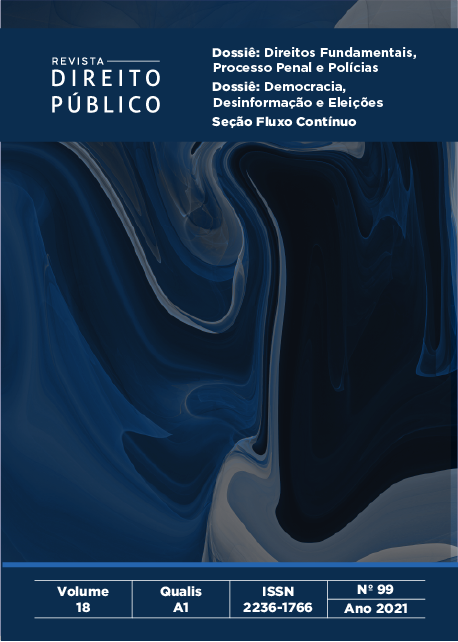Combinando Bibliotecas de Anúncios com Checagem de Fatos para Aumentar a Transparência sobre a Desinformação
DOI:
https://doi.org/10.11117/rdp.v18i99.5741Palavras-chave:
fake news, desinformação, regulação de plataformas, liberdade de expressão, anúncios algorítmicosResumo
Ainda que muitas pessoas associem fake news a políticos, um componente fundamental da atual crise de desinformação ameaçando democracias é o fenômeno de sites que produzem desinformação por razões comerciais. Pessoas e organizações sem escrúpulos lucram emulando o estilo de comunicação de veículos de imprensa tradicionais, mas sem o esforço para cumprir diretrizes jornalísticas básicas na produção de informação verídica. A razão pela qual esse modelo de negócios é viável é que uma parcela crescente do dinheiro para anúncios é alocada por algoritmos. Veículos obscuros não atrairiam receita substancial de propaganda se as empresas estivessem tomando decisões individualizadas sobre onde colocar seus anúncios. Mas o micro direcionamento removeu o incentivo dos anunciantes de associar sua marca somente a fontes de notícias com boa reputação. Em substituição ao antigo modelo, agora as empresas anunciantes recebem uma oferta de grupos demográficos cuidadosamente demarcados e tomam decisões baseadas em quem atingir com a propaganda, em vez de decisões sobre qual site patrocinar. Decisões automatizadas de alocação de anúncios podem ser obscuras até para os próprios anunciantes. Este artigo adota metodologia teórica para identificar uma possível solução para mitigar o problema. O resultado encontrado é de que uma resposta regulatória que criasse mais transparência para os anúncios algorítmicos, assim realinhando os incentivos dos anunciantes, negaria receita de propaganda a publicadores de desinformação prejudicial. A melhor forma de alcançar esse objetivo é fornecer às empresas anunciantes e ao público em geral um conjunto de dados detalhados em larga escala sobre gastos com propaganda que seja cruzado com bases de dados de checagem de fatos.
Downloads
Referências
ADAIR, Bill; STENCEL, Mark. How we identify fact-checkers. Reporter’s Lab, 22 jun. 2016. Disponível em: https://reporterslab.org/how-we-identify-fact-checkers/.
ALBA, Davey; FRENKEL, Sheera. Why Facebook’s blocking of new political ads may fall short. The New York Times, 4 set. 2020. Disponível em: https://www.nytimes.com/2020/09/04/technology/facebooks-political-ads-block-election.html.
ALLCOTT, Hunt; GENTZKOW, Matthew. Social media and fake news in the 2016 election. Journal of Economic Perspectives, v. 31, n. 2, 2017.
AMAZEEN, Michelle A. Journalistic interventions: the structural factors affecting the global emergence of fact-checking. Journalism, v. 21, n. 1, 2020.
BAKER, Jennifer. Facebook Ad Library: Only 3 ‘Brexit’ ads for whole month. Yeah, right! TNW, 1º nov. 2018. Disponível em: https://thenextweb.com/contributors/2018/11/01/facebook-ad-library-only-3-brexit-ads-for-whole-month-yeah-right/.
BELL, Emily; OWEN, Taylor. The platform press: how silicon valley reengineered journalism. Tow Center for Digital Journalism, 29 mar. 2017. Disponível em: https://www.cjr.org/tow_center_reports/platform-press-how-silicon-valley-reengineered-journalism.php.
BINFORD, Matthew T. et al. Invisible transparency: visual attention to disclosures and source recognition in Facebook political advertising. Journal of Information Technology & Politics, 2020, ahead of print.
BOREL, Brooke. Fact-checking won’t save us from fake news. FiveThirtyEight, 4 jan. 2017. Disponível em: https://fivethirtyeight.com/features/fact-checking-wont-save-us-from-fake-news/.
BRAUN, Joshua A.; COAKLEY, John D.; WEST, Emily. Activism, advertising, and far-right media: the case of Sleeping Giants. Media and Communication, v. 7, n. 4, 2019.
BRAUN, Joshua A.; EKLUND, Jessica L. Fake news, real money: ad tech platforms, profit-driven hoaxes, and the business of journalism. Digital Journalism, v. 7, n. 1, 2019.
BUKOVSKÁ, Barbora. The European Commission’s Code of conduct for countering illegal hate speech online. An analysis of freedom of expression implications. The Transatlantic Working Group Papers Series, 7 maio 2019. Disponível em: https://cdn.annenbergpublicpolicycenter.org/wp-content/uploads/2020/05/EC_Code_of_Conduct_TWG_Bukovska_May_2019.pdf.
CAMBRIDGE CONSULTANTS. Use of AI in Online Content Moderation. OFCOM, 2019. Disponível em: https://www.ofcom.org.uk/__data/assets/pdf_file/0028/157249/cambridge-consultants-ai-content-moderation.pdf.
COMISSÃO EUROPEIA. Code of practice against disinformation: commission welcomes the commitment of online platforms ahead of the European elections. Comissão Europeia, 23 abr. 2019. Disponível em: https://ec.europa.eu/commission/presscorner/detail/en/STATEMENT_19_2174.
CONSTANTINE, John. Facebook and Instagram launch US political ad labeling and archive. TechCrunch, 24 maio 2018. Disponível em: https://techcrunch.com/2018/05/24/facebook-political-ad-archive/.
COOK, Jesselyn. A toxic “infodemic”: the viral spread of Covid-19 conspiracy theories. HuffPost, 4 jul. 2020. Disponível em: https://www.huffpost.com/entry/coronavirus-conspiracy-theories-social-media_n_5e83d701c5b6a1bb764f6d3b.
DAVEY-ATTLEE, Florence; SOARES, Isa. The fake news machine: inside a town gearing up for 2020. CNN, 13 set. 2017. Disponível em: https://money.cnn.com/interactive/media/the-macedonia-story/.
DI DOMENICO, Giandomenico et al. Fake news, social media and marketing: a systematic review. Journal of Business Research, n. 124, 2021.
DOBBER, Tom; FATHAIGH, Ronan Ó; BORGESIUS, Frederik J. Zuiderveen. The regulation of online political micro-targeting in Europe. Internet Policy Review, v. 8, n. 4, 2019.
EMBAIXADOR FRANCÊS PARA ASSUNTOS DIGITAIS. Facebook Ads Library Assessment. Embaixador Francês para Assuntos Digitais, 2019. Disponível em: https://disinfo.quaidorsay.fr/en/facebook-ads-library-assessment. Acesso em: 2 fev. 2021.
FACEBOOK HELP CENTER. What is the Facebook Ad Library and how do I search it? Facebook. Disponível em: https://www.facebook.com/help/259468828226154. Acesso em: 2 fev. 2021.
FENWICK, Mark D.; KAAL, Wulf A.; VERMEULEN, Erik P. M. Regulation tomorrow: what happens when technology is faster than the law? American University Business Law Review, v. 6, n. 3, 2017.
FRIDKIN, Kim; KENNEY, Patrick J.; WINTERSIECK, Amanda. Liar, liar, pants on fire: how fact-checking influences citizens’ reactions to negative advertising. Political Communication, v. 32, n. 1, 2015.
FUNDAÇÃO MOZILLA. Data Collection Log – EU Ad Transparency Report. Fundação Mozilla, 2019. Disponível em: https://adtransparency.mozilla.org/eu/log/. Acesso em: 2 fev. 2021.
GARCIA, Raphael Tsavkko. Brazil’s “fake news” bill won’t solve its misinformation problem. MIT Technology Review, 10 set. 2020. Disponível em: https://www.technologyreview.com/2020/09/10/1008254/brazil-fake-news-bill-misinformation-opinion/.
GOLDMAN, Alvin I.; BAKER, Daniel. Free speech, fake news, and democracy. First Amendment Law Review, n. 18, 2019.
GORWA, Robert. The platform governance triangle: conceptualising the informal regulation of online content. Internet Policy Review, v. 8, n. 2, 2019.
GRAHAM, Richard Graham. Google and advertising: digital capitalism in the context of post-Fordism, the reification of language, and the rise of fake news. Palgrave Communications, v. 3, n. 45, 2017.
GRIMMELMANN, James. The virtues of moderation. Yale Journal of Law and Technology, v. 17, n. 1, 2015.
GUESS, Andrew et al. Fake news, Facebook ads, and misperceptions. Assessing information quality in the 2018 U.S. midterm election campaign. Working Paper, 2019. Disponível em: http://www.dartmouth.edu/~nyhan/fake-news-2018.pdf. Acesso em: 30 jun. 2021.
HA, Anthony. Twitter launches its Ads Transparency Center, where you can see ads bought by any account. TechCrunch, 28 jun. 2018. Disponível em: https://techcrunch.com/2018/06/28/twitter-ads-transparency-center/.
HARTMANN, Ivar. A new framework for online content moderation. Computer Law & Security Review, v. 36, 2020.
HATMAKER, Taylor. Google releases a searchable database of US political ads. TechCrunch, 15 ago. 2018. Disponível em: https://techcrunch.com/2018/08/15/google-political-ad-library/.
HUMPRECHT, Edda. How do they debunk “fake news”? A cross-national comparison of transparency in fact-checks. Digital Journalism, v. 8, n. 3, 2020.
HUTCHINSON, Andrew. Facebook expands ad archive to all ads and pages. SocialMediaToday, 29 mar. 2019. Disponível em: https://www.socialmediatoday.com/news/facebook-expands-ad-archive-to-all-ads-and-pages/551584/.
KADRI, Thomas E. Platforms as blackacres. UCLA Law Review, n. 68, 2021. Disponível em: https://papers.ssrn.com/sol3/papers.cfm?abstract_id=3742086.
KENNEDY, Pagan. How to destroy the business model of Breitbart and fake news. The New York Times, 7 jan. 2017. Disponível em: https://www.nytimes.com/2017/01/07/opinion/sunday/how-to-destroy-the-business-model-of-breitbart-and-fake-news.html.
KHALID, Amrita. Twitter’s political ad ban won’t stop politicians getting their messages out. Quartz, 6 nov. 2019. Disponível em: https://qz.com/1742852/campaigns-arent-worried-about-twitters-political-ad-ban/.
LAZER, David M. al. The science of fake news. Science, n. 359, 2018.
LEERSSEN, Paddy et al. Platform ad archives: promises and pitfalls. Internet Policy Review, v. 8, n. 4, 2019.
LYTVYNENKO, Jane. In 2020, Disinformation Broke The US. BuzzFeed, 6 dez. 2020. Disponível em: https://www.buzzfeednews.com/article/janelytvynenko/disinformation-broke-us.
MARI, Angelica. Brazilian Senate passes fake news bill. ZDNet, 1º jul. 2020. Disponível em: https://www.zdnet.com/article/brazilian-senate-passes-fake-news-bill/.
MERRILL, Jeremy; ALLEN, Marshall. “Trumpcare” does not exist. Nevertheless Facebook and Google Cash In on Misleading Ads for “Garbage” Health Insurance. ProPublica, 20 out. 2020. Disponível em: https://www.propublica.org/article/trumpcare-does-not-exist-nevertheless-facebook-and-google-cash-in-on-misleading-ads-for-garbage-health-insurance.
MILLS, Adam J.; PITT, Christine; FERGUSON, Sarah Lord. The relationship between fake news and advertising brand management in the era of programmatic advertising and prolific falsehood. Journal of Advertising Research, v. 59, n. 1, 2019.
OHLHEISER, Abby. This is how Facebook’s fake-news writers make money. The Washington Post, 18 nov. 2016. Disponível em: https://www.washingtonpost.com/news/the-intersect/wp/2016/11/18/this-is-how-the-internets-fake-news-writers-make-money/.
PEREL, Maayan; ELKIN-KOREN, Niva. Accountability in Algorithmic Copyright Enforcement. Stanford Technology Law Review, n. 19, 2016.
REDE INTERNACIONAL DE CHECAGEM DE FATOS. International Fact-Checking Network fact-checkers’ code of principles. Disponível em: https://www.poynter.org/ifcn-fact-checkers-code-of-principles/. Acesso em: 3 fev. 2021.
ROSENBERG, Matthew. Ad Tool Facebook built to fight disinformation doesn’t work as advertised. The New York Times, 25 jul. 2019. Disponível em: https://www.nytimes.com/2019/07/25/technology/facebook-ad-library.html.
SANDBERG, Sheryl. Hearing before the United States Senate select committee on intelligence. Senado dos Estados Unidos, 5 set. 2018, p. 5. Disponível em: https://www.intelligence.senate.gov/sites/default/files/documents/os-ssandberg-090518.pdf.
SENADO FEDERAL. Projeto de Lei nº 2.630, de 2020. Disponível em: https://www25.senado.leg.br/web/atividade/materias/-/materia/141944.
SERRANO, Juan Carlos Medina et al. Exploring political ad libraries for online advertising transparency: lessons from Germany and the 2019 European elections. SMSociety’20: International Conference on Social Media and Society, 2020. Disponível em: https://dl.acm.org/doi/abs/10.1145/3400806.3400820. Acesso em: 2 fev. 2021.
SKIBINSKI, Matt. Misinformation won’t stop unless we stop it. Predictions for Journalism 2021. NiemanLab, 2020. Disponível em: https://www.niemanlab.org/2020/12/misinformation-wont-stop-unless-we-stop-it/.
SPINDLER, Gerald. Internet Intermediary Liability Reloaded The New German Act on Responsibility of Social Networks and its (In-) Compatibility with European Law. JIPITEC, n. 8, 2017.
TUFEKCI, Zeynep. Algorithmic harms beyond Facebook and Google: emergent challenges of computational agency. Colorado Technology Law Review, n. 13, 2015.
UNIÃO EUROPEIA. Código de Práticas sobre Desinformação da União Europeia. 2018. Disponível em: https://ec.europa.eu/newsroom/dae/document.cfm?doc_id=54454. Acesso em: 3 fev. 2021.
VISENTIN, Marco; PIZZI, Gabriele; PICHIERRI, Marco. Fake news, real problems for brands: the impact of content truthfulness and source credibility on consumers’ behavioral intentions toward the advertised brands. Journal of Interactive Marketing, n. 45, 2019.
VLADECK, David C. Information access – Surveying the current legal landscape of federal right-to-know laws. Texas Law Review, n. 86, 2008.
WAGNER, Ben Wagner et al. Regulating transparency? Facebook, Twitter and the German Network Enforcement Act. FAT* ‘20: Conference on Fairness, Accountability, and Transparency, 2020. Disponível em: https://dl.acm.org/doi/abs/10.1145/3351095.3372856. Acesso em: 1º fev. 2021.
WALTER, Nathan et al. Fact-checking: a meta-analysis of what works and for whom. Political Communication, v. 37, n. 3, 2019.
WARNER, Mark R. The Honest Ads Act. Disponível em: https://www.warner.senate.gov/public/index.cfm/the-honest-ads-act. Acesso em: 3 fev. 2021.
WOOD, Abby K.; RAVEL, Ann M. Fool me once: regulating fake news and other online advertising. California Law Review, n. 91, 2018.
ZINGALES, Luigi; LANCIERI, Filippo Maria. Stigler Committee on Digital Platforms: Policy Brief. George J. Stigler Center for the Study of the Economy and the State, 2019. Disponível em: https://www.chicagobooth.edu/-/media/research/stigler/pdfs/policy-brief---digital-platforms---stigler-center.pdf.
Publicado
Como Citar
Edição
Seção
Licença
Copyright (c) 2021 Direito Público

Este trabalho está licenciado sob uma licença Creative Commons Attribution-NonCommercial 4.0 International License.
O(s)/A(s) autores(as) dos manuscritos submetidos concorda(m) com as regras a seguir:
1) Todos os autores e autoras participaram do trabalho, são responsáveis pelas ideias e conceitos nele emitidos e atestam sua conformidade com os princípios éticos exigidos.
2) Todos os autores e autoras concordam com a forma final do trabalho e em ceder os direitos para publicação nos canais de publicação da Escola de Direito do IDP.
3) Todos os autores e autoras informam que o manuscrito é de sua autoria e assumem a responsabilidade pelo trabalho, declarando que a obra a ser publicada não infringe quaisquer direitos de propriedade intelectual de terceiros.
3.1) Em caso de submissão simultânea, além da reprovação imediata do artigo e comunicação ao(s) respectivo(s) periódico(s), a Revista Direito Público se reserva o direito de não receber novas submissões de todos os autores implicados pelo prazo de 2 (dois) anos, contado a partir da data de ciência do fato.
4) Todos os autores e autoras autoriza(m) a edição de seu trabalho e cede(m) à Escola de Direito do IDP os direitos de autor para reproduzir, editar e publicar ou veicular o citado trabalho em qualquer forma midiática, resguardada a autoria, em particular sob forma digital, em arquivo eletrônico online na Internet, bem como armazená-los em seu repositório de acordo com o desenvolvimento do processo editorial. Esta concessão não terá caráter oneroso para a Escola de Direito do IDP, não havendo remuneração sob qualquer modalidade pela utilização do referido material, tendo este o caráter de colaboração científica.












